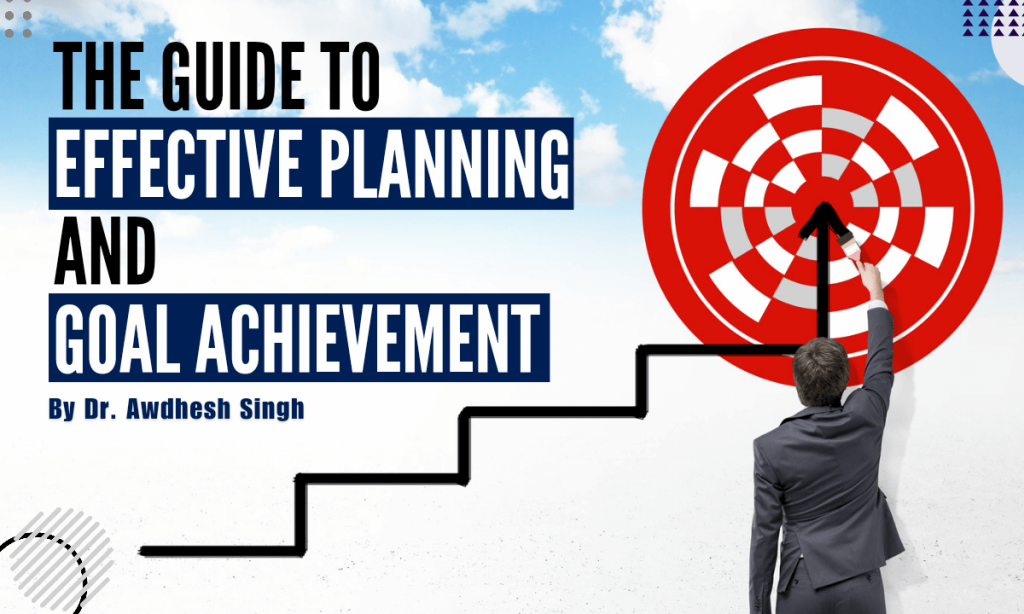
‘A goal without a plan is just a wish.’ — Antoine de Saint-Exupéry
Planning is the fundamental management function that involves deciding beforehand what to do, when to do, how to do and who should do. These are the four critical points we must decide in advance to avoid facing any problems and to maximise future results. Unfortunately, most people fail to plan well, and they pay a hefty price for it.
Importance of Planning
One of Aesop’s fables is a lesson in the importance of planning:
Once upon a time, there was a massive tree on the bank of a river. Many birds made their nests on its branches, living very happily. One day, it was raining heavily, and some monkeys in the nearby tree got drenched and were shivering with cold. Meanwhile, the birds were sitting very comfortably inside their nests. After some time, one of the birds advised the monkeys, ‘Why don’t you build a home like us? If you have a home, you would not have to suffer like this.’
On hearing this, the monkeys got annoyed. They said to themselves, ‘These birds are living comfortably…that is why they are criticising us like this. Let the rain stop. We will show them how to build a home!’
As soon as the rain stopped, the monkeys climbed up the tree and destroyed the birds’ nests. They broke their eggs and threw the young ones down. The poor birds had to fly away to save their lives.
This story explains the importance of planning and the fact that most people don’t appreciate the importance of plans. They even resent when someone gives them sound advice. However, smarter people anticipate problems in advance and take the necessary steps to protect themselves in the future. They develop an elaborate plan to face them, just like the birds make their nests and save themselves from rainy days. Unfortunately, the monkeys did not do that and suffered.
Fools don’t plan anything and live happily when the sun shines. However, they suffer when the problem arrives. US President John F Kennedy wisely said, ‘The time to repair the roof is when the sun is shining.’ When things are going well, that is the time that we should plan for the eventuality. If we fail to plan, we can’t face the eventuality. The time we spend on planning is not wasted time, rather, it helps us save much more time in the future.
The Benefits of Planning
Some of the benefits of planning are given below.
- Clear Direction: A plan acts as a roadmap, guiding your actions and ensuring everyone works towards the same goal.
- Increased Efficiency: When everyone’s on the same page, there’s less duplication of effort and a smoother workflow.
- Manageable Tasks: Complex projects become less daunting when broken down into smaller, achievable steps.
- Reduced Risk: Proper planning helps identify and mitigate potential problems before they arise.
- Improved Coordination: Everyone understands their role and how it contributes to the overall goal.
- Optimised Resource Allocation: Planning ensures resources are used effectively to achieve the desired outcome.
- Effective Monitoring: Clear plans make tracking progress and assessing individual and team performance easier.
- Motivated Team: Defined goals and deadlines keep team members engaged and working towards success.
- Boosted Creativity: Knowing the goal motivates the exploration of innovative solutions to achieve it on time.
- Faster Decisions: Deadlines encourage timely decision-making, keeping the project moving forward.
- Achieved Dreams: Effective planning brings you closer to fulfilling your aspirations by making them actionable.
Planning bridges the gap between where we are and where we want to go. So, the most crucial thing in planning is knowing where we want to go and what we want to achieve in our lives. If we are unsure of the plan’s ultimate purpose, then planning is of no use.
Purpose of Planning – Choose the Right Goals for Yourself
Let me narrate a fascinating story of an American investment banker and a fisherman that explains how important it is to identify the right goal in our lives.
An American investment banker was on holiday in a Mexican village when he met a local fisherman one afternoon. The fisherman had caught several large yellowfin tuna fish and was emptying the load onto his small boat. The banker complimented him on his catch and asked why he had come back so early from fishing.
The fisherman replied, ‘I sleep till late, fish a little, play with my children, take a siesta with my wife, stroll the village each evening, drink some wine and play the guitar with my friends. I have a full and busy life.’
The banker scoffed, saying, ‘I have done an MBA from Harvard, and I can help you.’ He then told the fisherman a big plan. He told him how he could spend a few hours more each day fishing into the sea and save money, and soon, he could line up a fleet of fishing boats and then expand his business into a million-dollar enterprise.
The fisherman asked, ‘But how long will all this take?’ To which the American replied, ‘Fifteen to twenty years.’
So, the fisherman thought for a while and said, ‘But, what then?’
The American laughed and said, ‘Then you can retire and move to a small coastal fishing village, where you can sleep till late, fish a little, play with your kids, take a siesta with your wife, stroll in the village in the evenings, and sip wine and play your guitar with your friends.’
On that, the smiling fisherman said, ‘But that’s what I am doing right now. Why wait for twenty years?”
Therefore, we must not only have plans but also know what we want to achieve in our lives. In this case, the American banker needed to precisely know what the fisherman wanted to accomplish in the long term. Nevertheless, he prepared a plan for the fisherman in which fifteen to twenty years of his life were to be wasted. Why take a long path to reach a place so near? The fisherman was much wiser than the investment banker without much education, as he knew what he wanted in life.
How to Make a Good Plan – Steps for Effective Planning
Stage 1: Setting SMART Goals
The first stage of planning is to write down your goals because planning is useless unless you know your destination. The famous management guru Peter Drucker rightly said, ‘There is nothing so useless as doing efficiently that which should not be done at all.’
We can use the ‘SMART formula’ for goal setting:
- Specific: Identifying the ‘who’, ‘what’, ‘when’, ‘where’, and ‘why’ of your goals.
- Measurable: Have a clear-cut understanding of how you will measure your progress.
- Achievable: The goals must be challenging but realistic, neither too easy nor too difficult.
- Relevant: The goal must fit into your broader goals in life.
- Time-bound: There must be a deadline and a timeline to complete the specific tasks.
Stage 2: Breaking Down Goals and Creating a Timeline
In the second stage, slice and break down the goals into smaller goals. After that, you must create a plan that provides a stipulated amount of time for each goal, such as a day, week, month or year. You must keep updating the timelines depending on the progress of each goal. You can plan for the day early in the morning or a day before and implement the plan over the course of the day. In the same way, you can plan the weekly, monthly and yearly goals in advance, before the beginning of the week, month or year.
Stage 3: Feedback, Review, and Adjusting the Plan
In the third important step—‘feedback and review’—we must continuously assess whether we are going in the right direction or not. Therefore, we must get regular feedback on the progress of our goal from all the stakeholders and review the progress on a daily, weekly and monthly basis. We must accordingly review the deadlines to make them realistic. For example, sometimes, you may accomplish a goal earlier than expected. In such cases, you can advance to the next deadline.
On the other hand, when you fail to complete the present task in time, you can suitably postpone the deadline. While all attempts must be made to accomplish our tasks according to the plan, we must also be flexible with the deadline based on the ground situation, the feedback and the review.
Stage 4: Motivation for Goal Achievement
The fourth essential step of effective planning is ‘motivation’. We must constantly motivate our team members to achieve their goals by providing regular rewards and appreciation. The rewards could be financial, in the form of incentives, promotions or higher annual increments, while the appreciation can be verbal or written, such as appreciation certificates.
Furthermore, when some people fail to achieve their goals, they must be counselled, guided, and trained. Also, ‘only rewards’ don’t work unless they are also accompanied by punishments. Hence, in an extreme situation, we must not hesitate to punish and even dismiss the people who repeatedly fail to accomplish their assigned tasks.
Stage 5: Publicizing Progress and Fostering Team Performance
Finally, we must ‘publicise the progress’ to let people know how they are progressing. You must make people compete with each other for timely completion of the tasks. When we publicise the work of the better performers, other team members compare notes and try to give their best. They will also know if they are keeping up with the team or lagging behind.
Accordingly, we must publicly appreciate the achievers and act as a catalyst for others to work harder and deliver similar results. However, we must also ensure that the laggards are counselled or reprimanded in private so that they don’t feel humiliated and demotivated.
These few steps will help you plan your short-term, medium-term, and long-term goals and achieve them faster within a pre-decided timeline.
To Master Time Management, get the copy of my book Master Your Time, Master Your Life.
Popular Courses for Life Skills




